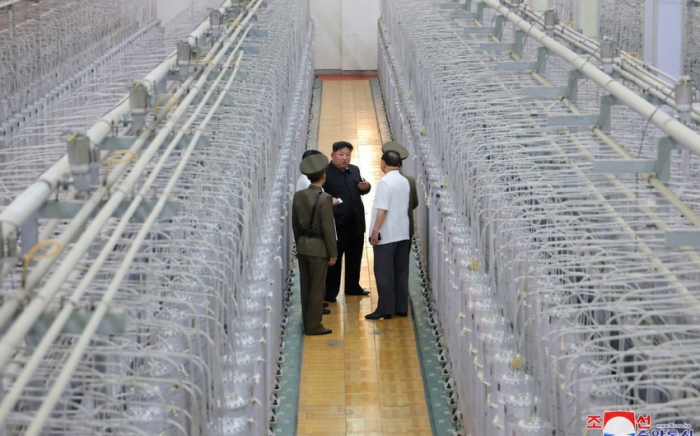Kim made the call during a visit to the Nuclear Weapons Institute and the "production base of weapon-grade nuclear materials," according to the Korean Central News Agency (KCNA). The dispatch did not release the location of the facility or date of the visit.
"He went round the control room of the uranium enrichment base to learn about the overall operation of the production lines," the KCNA said, adding that Kim expressed great satisfaction after being briefed that the "base is dynamically producing nuclear materials."
"When he personally went round the worksite, he said that he felt strong to see the worksite," the KCNA said. "He stressed the need to further augment the number of centrifuges in order to exponentially increase the nuclear weapons for self-defence true to the Party's line of building up nuclear armed forces."
It marks the first time North Korea has publicly revealed details of its uranium enrichment facility.
A uranium enrichment facility is used to produce highly enriched uranium (HEU) by placing uranium in centrifuges and spinning it at high speeds. HEU is essential for the manufacturing of nuclear warheads, along with plutonium.
South Korean and US intelligence agencies believe North Korea operates uranium enrichment facilities at the Kangson nuclear complex near Pyongyang and at the Yongbyon nuclear site.
In 2010, North Korea invited Siegfried Hecker, a renowned American nuclear scientist, to inspect its uranium enrichment facility at Yongbyon.
The recently mentioned location could be North Korea's second uranium enrichment plant in Kangson, as the dispatch reported that Kim had toured the "construction site," corresponding with recent observations made by the UN nuclear watchdog.
"In late Feb. 2024, work commenced on the construction of an annex to the main building in the Kangson Complex, significantly expanding the available floor space. The annex is now externally complete," International Atomic Energy Agency Director General Rafael Grossi said in a report in June.
North Korea is reportedly shifting its reliance from producing plutonium at the Yongbyon reactor to producing HEU underground, which can be done more covertly and in greater quantities.
Additionally, Kim called for improving the separation capacity of the centrifuges and accelerating the development of a new type of centrifuge to "further solidify the foundation for producing weapons-grade nuclear materials."
Kim was accompanied by Hong Sung-mu, deputy director handling munitions in the ruling Workers' Party, who is believed to have spearheaded North Korea's nuclear program.
The South Korean government strongly condemned North Korea for publicizing its uranium enrichment facility, calling the illegal development of nuclear weapons a clear violation of multiple UN Security Council resolutions.
"Any nuclear threat or provocation by North Korea will be met with an overwhelming and strong response from our government and military, based on the solid extended deterrence of the South Korea-US alliance," the unification ministry said.
During a key deterrence dialogue between South Korea and the United States earlier this month, the allies warned that North Korea could conduct significant provocations, such as a nuclear test or an intercontinental ballistic missile launch, close to the US presidential election in November.
Analysts say North Korea's sudden disclosure of the uranium enrichment facility is an attempt to flaunt its nuclear capabilities ahead of the election, aiming to increase its leverage in future negotiations with the US.
"It seems North Korea is signaling its seventh nuclear test before the US presidential election on November 5, especially before the founding anniversary the ruling Workers' Party on October 10," said Cheong Seong-chang, an expert at the Sejong Institute, a think tank specializing in diplomacy and security.
Pyongyang last conducted an underground nuclear test in 2017.
The defense ministry echoed the view, adding that further analysis is underway.
"By disclosing the facility, the North appears to have sought to shore up domestic unity while boasting its nuclear capabilities and ramping up nuclear threats," a ministry official told reporters.
The unification ministry has cautioned North Korea against proceeding with any nuclear tests but warned of unprecedented sanctions if it defies international warnings.
"While we will not speculate on the likelihood of a nuclear test, should North Korea push ahead despite global warnings, it will face an unprecedented level of deterrence and sanctions," Koo Byoung-sam, a spokesperson for the ministry, said during a press briefing.
AzVision.az
More about:
















































